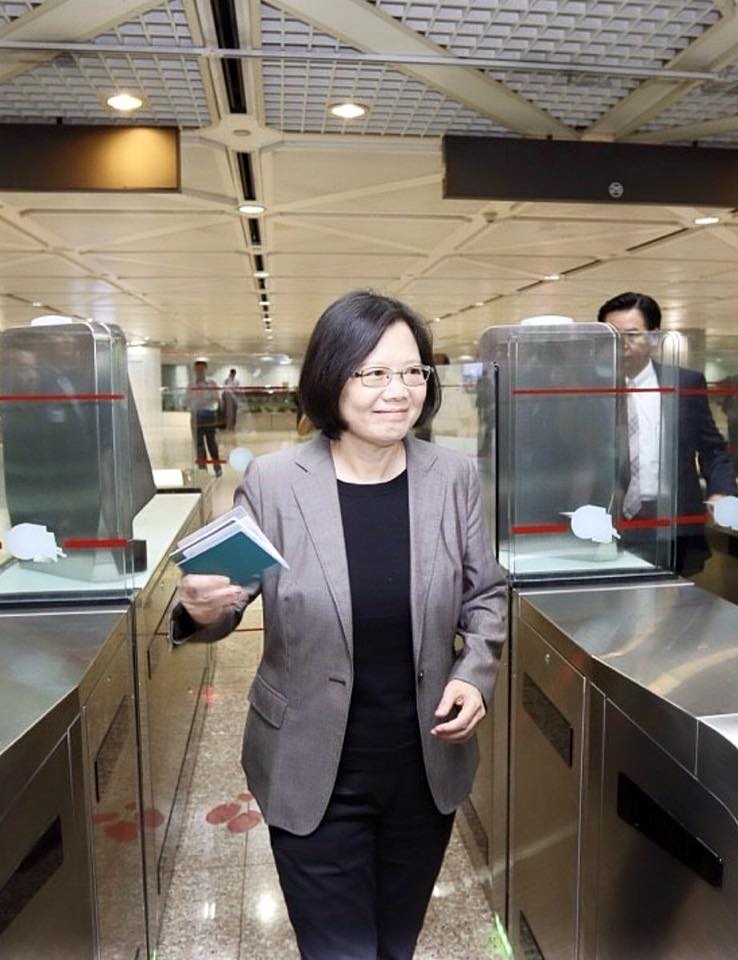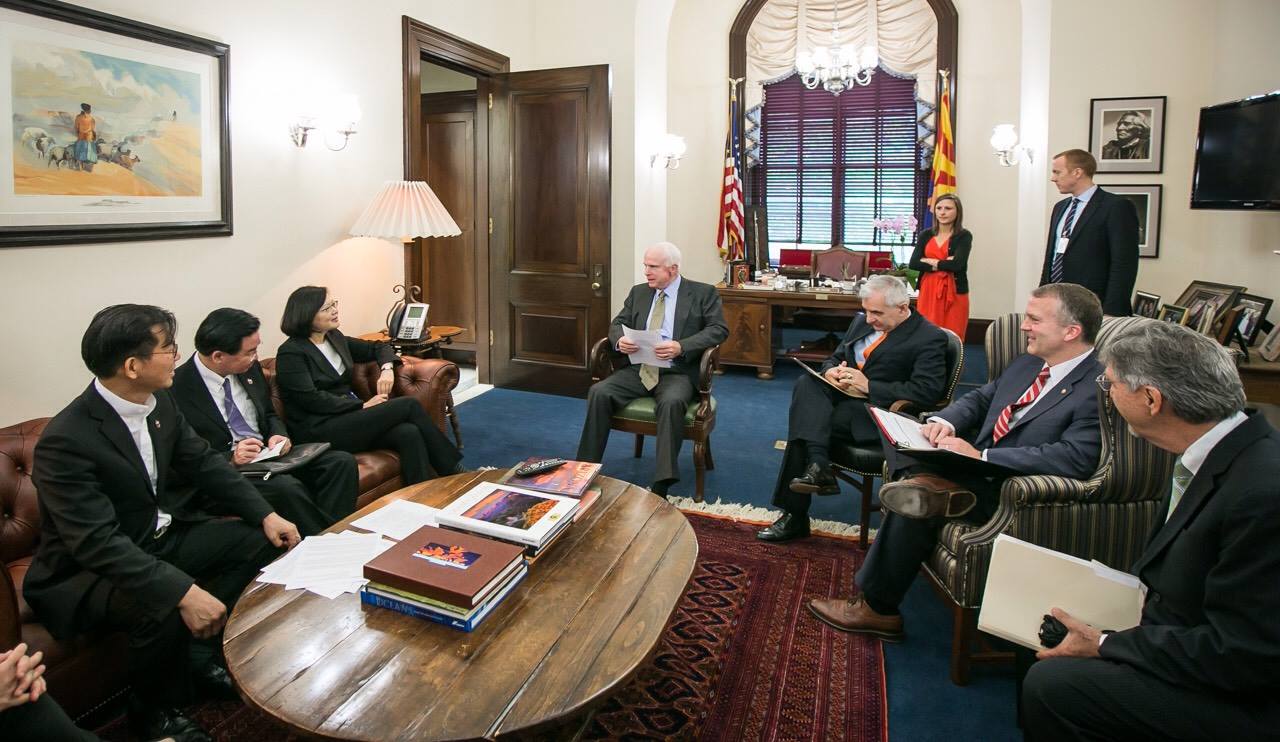by Brian Hioe
語言:
English
Photo Credit: Tsai Ing-wen/Facebook
DPP PRESIDENTIAL CANDIDATE Tsai Ing-Wen’s recent twelve-day tour of the United States has been hailed as a success, not only by her supporters, but also by outside commentators. It remains to be seen at a future point in time whether the visit was genuinely successful or not, as contingent upon a successful presidential candidate and an presidential administration able to maintain friendly ties with the United States. Certainly, while the purpose of Tsai’s visit was in part to raise the international profile of her campaign among overseas Taiwanese and Taiwanese-Americans, we might also point towards the integral importance of the meetings that took place between Tsai, American senators, and government officials.
 Tsai Ing-Wen at the airport returning to Taiwan. Photo credit: 蔡英文 Tsai Ing-wen Facebook Page
Tsai Ing-Wen at the airport returning to Taiwan. Photo credit: 蔡英文 Tsai Ing-wen Facebook Page
Particularly important were meeting with members of the Armed Services Committee, including Senator John McCain, members of the Foreign Affairs Committee, and Deputy Secretary of State Antony Blinken, including a visit to the State Department—which would Tsai the first Taiwanese presidential candidate to have done so. Tsai previously visited the United States during late 2011 during her last presidential run for a three-day series of meetings with US government officials, but did not visit the State Department. Of course, if we look at the politicians that Tsai met with, we might note that they were those senators and officials in positions concerned with foreign affairs and defense. No surprise there, for this might have been the true importance of Tsai’s visit to Washington—her need to meet with American government officials and convince them that she would not be disruptive to regional stability. And this aspect of Tsai’s visit has gone underemarked upon in commentary about the meeting.
Why Was Tsai Granted Such Access to the US Government This Time Around?
INDEED IT IS not without precedent for representatives of political parties that America might see as unduly disruptive of regional order to pay visits to America in order to reassure the American government that they would not, in fact, be so disruptive. One thinks of the visit of the Greek radical Leftist party SYRIZA to the US State Department in early 2013, for example, with SYRIZA leader and current Greek Prime Minister Alex Tsipras discussing matters of foreign policy with senior US State Department officials. At that time, it looked for the first time that SYRIZA was on the poise of taking power of the Greek government, though SYRIZA did not actually take power until much January 2015, and it was such that US State Department officials were willing to meet with SYRIZA politicians. For their part, SYRIZA politicians sought to assuage the US that they would not be an insurrectionary force against American foreign interests and would not be disruptive to regional stability in Europe.
Obviously, Tsai’s recent visit was in the same mold, as was her 2011 visit. And while one vaguely suspects that once the KMT presidential candidate is finally settled on, he or she will announce a similar visit to the United States in imitation of Tsai, including meetings with US government officials, there is less of a need for them to do so where it is Tsai that need reassure the United States. It is not the KMT, of course, which is viewed as an unnecessary troublemaker.
 Tsai Ing-Wen meeting with John McCain (R-Arizona), Jack Reed (D-Rhode Island), and Dan Sullivan (R-Alaska). Photo credit: 蔡英文 Tsai Ing-wen Facebook Page
Tsai Ing-Wen meeting with John McCain (R-Arizona), Jack Reed (D-Rhode Island), and Dan Sullivan (R-Alaska). Photo credit: 蔡英文 Tsai Ing-wen Facebook Page
If some have pointed to the historic nature of Tsai’s visit to the State Department, or the historic nature of that the US allowed a DPP presidential candidate onto American shores, we might instead point to the fact this is hardly a sign of “progress”. Rather, if Tsai is to attempt to minimize the chances of undue American interference in her campaign, she need reassure the American government that she would not be disruptive to regional stability in East Asia. This, of course, could be a game-changer for her campaign where swing votes for Taiwanese presidential elections have sometimes hinged upon the issue of maintaining the precarious balance of Taiwan between China and America.
After all, last time Tsai ran for president in 2012, accordingly, the US did interfere with her campaign, with an unnamed “senior US government official” placing a phone call to the Financial Times informing the Financial Times of the Obama administration’s lack of faith in Tsai to stand up to China. Though some analysts suggested the call had been placed from the White House, the US State Department later denied that this call was representative of the State Department or US foreign policy in any way. Nevertheless, this was damaging to Tsai’s 2012 campaign, which she lost to Ma Ying-Jeou.
Speculation has followed about whether these were the actions of a lone American government official out to get Tsai—it is certainly true that there are a number of American government officials who resent Taiwan’s pan-Greens because of a perception that they upset the balance with China that America hopes to maintain. Or whether this was actually coordinated subterfuge organized by the American government. As with many things that go on behind closed doors, who can say?
But should it really surprise anyone that the US State Department would announce no change in its Taiwan policy after its meetings with Tsai when probed on the question subsequently? Obviously, it is true that the State Department was responding to critics of its meeting with Tsai, including those within the American government establishment opposed to establishing stronger ties with Taiwan—whether out of a conviction that America need not risk ties with China through developing relations with Taiwan—as well as the complaints of China itself.
And it is also true Tsai hasn’t won the election just yet, so it seems a bit early to expect any change in American policy to occur. If individuals were first enthused about touting Tsai’s tour as a success in order that it may be another stepping stone to a successful electoral campaign, then disappointed by the announcement by the US State Department that nothing about American policy towards Taiwan had changed, they were expecting too much.
 Tsai during a visit to Facebook headquarters. Photo credit: 蔡英文 Tsai Ing-wen Facebook Page
Tsai during a visit to Facebook headquarters. Photo credit: 蔡英文 Tsai Ing-wen Facebook Page
But why was it that Tsai was seemingly granted such access this time around, as compared to before? Why was it that Tsai’s tour was so much more high profile? Namely, the US has not been unaware of political developments in Taiwan from last year to the present and realizes that there is a high likelihood of a Tsai presidential victory. While we will see as to the actions of the United States going forward, it is probable that the United States will need to accommodate itself to the reality of a Tsai victory in which it may have no capacity to impede—thus, the US has a need to develop grounds for establishing a relationship with Tsai while maintaining the current position of an official non-position regarding Taiwan.
The Other Side of Tsai Ing-Wen’s Visit to the United States: The Need to Pacify the United States
THE FLIPSIDE IS that Tsai’s visit, although serving multiple tasks, likely also has as one of its key purposes is the need to pacify the US in regards to her prospective future administration of Taiwan where the US can take actions deleteriously harmful to Taiwan—sometimes just out of sheer malevolence towards Taiwan, provided that phone call to the Financial Times did just come from a rogue American government official acting on his own with a bone to pick against Taiwan for disrupting cross-strait relations.
Perhaps the better question we might ask and, one which has not been asked enough to date, is what does it mean for the United States, a supposed democracy, to interfere in the democratic processes of another sovereign territory, if not nation? Even if means exerting undue influence over the electoral processes of that sovereign territory? And why have Taiwanese to date not sought to call the United States to take task for unduly arrogating the right of Taiwanese to democratically decide for themselves what government they want to have to itself? After all, if we are to look back towards the history of martial law in Taiwan, that the KMT regimes was propped up by the US, the US has a long history of repressing democracy in Taiwan.
Why, then, have Taiwanese largely uncritically made entreaties of the US to aid Taiwan, sometimes founded upon appealing to mutual interest, despite not only the lessons of history, but in apparent blindness the present situation? Obviously Tsai Ing-Wen and other politicians in positions of power will not confront the US, as Taiwan would probably suffer severe consequences with the total loss of American passive support, however tenuous that support is at present. Accordingly, Tsai had to visit the US in order to ward off that dangerous possibility. But in this way, rather than hail the Tsai Ing-Wen’s tour of the United States as a glorious example in building international ties of friendship between Taiwan and the United States perhaps we should see it as that the United States, in some way, holds Taiwan at its mercy. That may be what we term American hegemony over Taiwan. Of course, this is a situation hardly particular to Taiwan, and we do well to keep that in mind.




